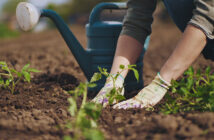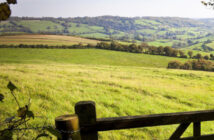Nicholas Watts of Vine House Farm near Spalding, Lincs has made his farm an example for caring for the environment, while building a successful business. It’s an approach which was judged worth of a win in the NSF Agriculture sponsored Champion Sustainable Farm Practices category of the Food and Farming Industry Awards.
The farm grows a wide range of crops, grow wheat, potatoes, sugar beet, winter barley, spring barley, spring wheat, rape, peas, red millet, white millet, canary seed , sunflower seed, naked oats, organic stubble turnip seed, organic ryegrass seed, organic red clover seed. Many are sold as wild bird food and there is a farm shop, which is the only farm in the village.
Nicholas Watts is very much engaged with sustainability and interest in the countryside. “I have several farm walks each year and on every farm walk there are people who have come over 100 miles,” he says. “I give talks on Farming and Wildlife throughout the country and I write a monthly newsletter.”
“It was in 1982 when I began to take an interest in the varying species of birds on my farm, at the same time I was doing breeding bird surveys for the British Trust for Ornithology, and the Lincolnshire Bird Club, but none of these surveys were on my land, so I decided to record the birds on my land. I continued this survey year on year, but it wasn’t until 1992 when I began evaluating and working out trends from the survey figures, that I was truly amazed to find, in fact, deeply perturbed, that my survey figures indicated that Corn Buntings had declined by 90% and Skylarks by 60%,” he says. “We were in fact wasting far too many of the worlds natural materials, burning and burying far too many of the earth’s precious organic bounties.”
“Today on Vine House Farm we do not have any waste, everything is used or sold,” he said. “I began feeding the birds in my various farmyards, thinking that they may be declining due to a lack of natural food in the winter. I attracted so many birds that it was a spectacle; I was seeing 600 to 800 buntings and finches in my yard at any one time, all day long. “I arranged an open day, so that people could come and see this confluence of birds, in fact to enjoy nature at its best; consequently, at that open day, two or three people asked me if I could sell them some bird food, which of course I did. The following year, the same spectacle occurred, so I had another open day, giving all the proceeds from the event to the Lincolnshire Wildlife Trust; once again, people asked me to sell them some bird seed, so there I was selling bird food, without even trying!
“I grow, clean, pack and dispatch the bird seed all from the farm so there is minimum amount of food miles on our home grown bird food; obviously our bought in products have the same food miles as anyone else. About seven years ago I tendered to be the recommended supplier of bird food to the Wildlife Trust. I was thrilled when The Wildlife Trust approved of my farming methods with the emphasis on my incorporation of wildlife habitat, and so I was chosen to be the supplier, resulting in them distributing my brochure to all of their members. 5% of all my bird food takings go to the Wildlife Trust; recently this sum had amounted to one million pounds, with our bird food sales still increasing.
“In 1998 after much thought, I decided to start farming organically, as that was the only way I could think of getting paid for farming with weeds in my crops, as it happened, it proved to be commercially viable, and has gone on to be a successful part of my farming programme. In a dry year, organic farming makes far more money than conventional farming methods, but in a wet yea, it is usually the other way round.
“It was in 1998 that I decided to grow my first crop of sunflowers; this enterprise has increased my bird food sales, so I set about growing canary seed, red millet, white millet and naked oats, this allowed me to produce my own good home grown mix. Today I am the largest grower of bird seeds in the UK.
“Much to my dismay, unfortunately, I cannot grow bird seed organically, as I need to kill it with a desiccant to make it ripen earlier so we can harvest it successfully here in the UK, so you can see my big dilemma. My organic farming is successful, which in turn helps to bring back the wildlife. I would love to increase my organic acreage, but my bird seed business is also successful.



